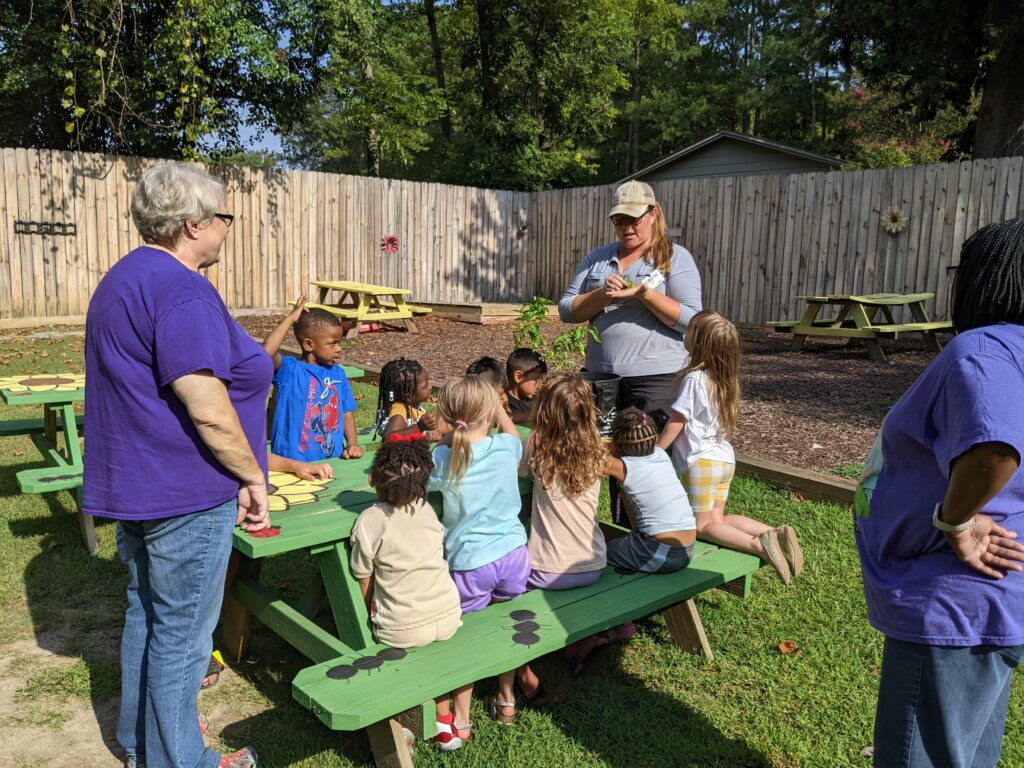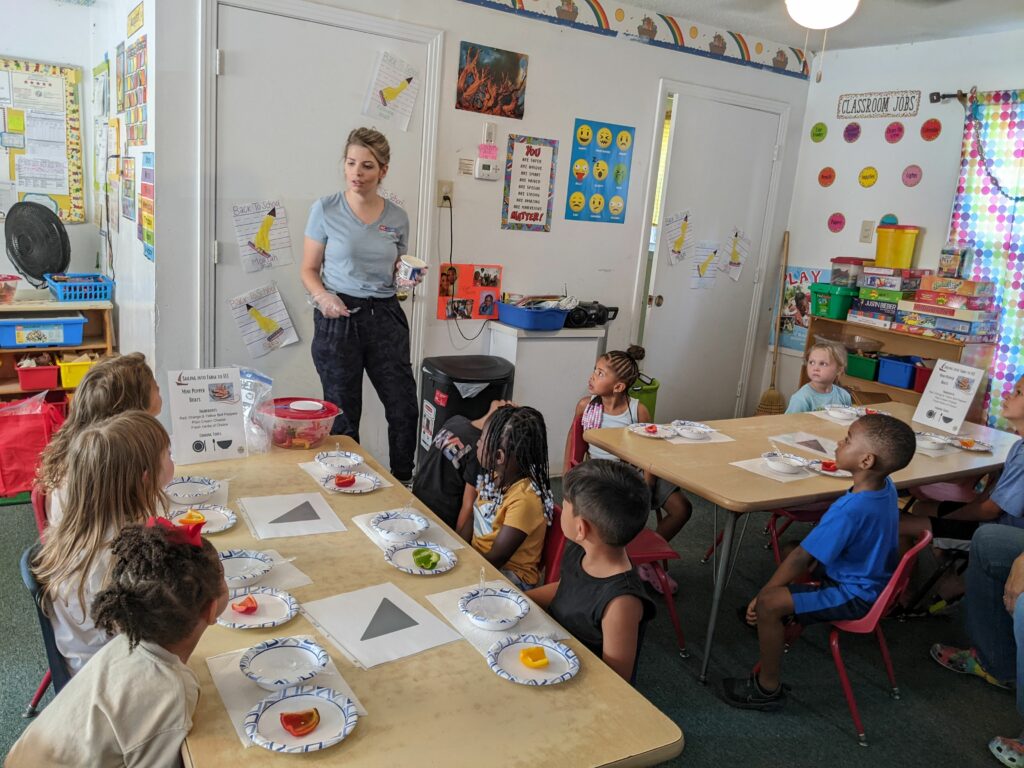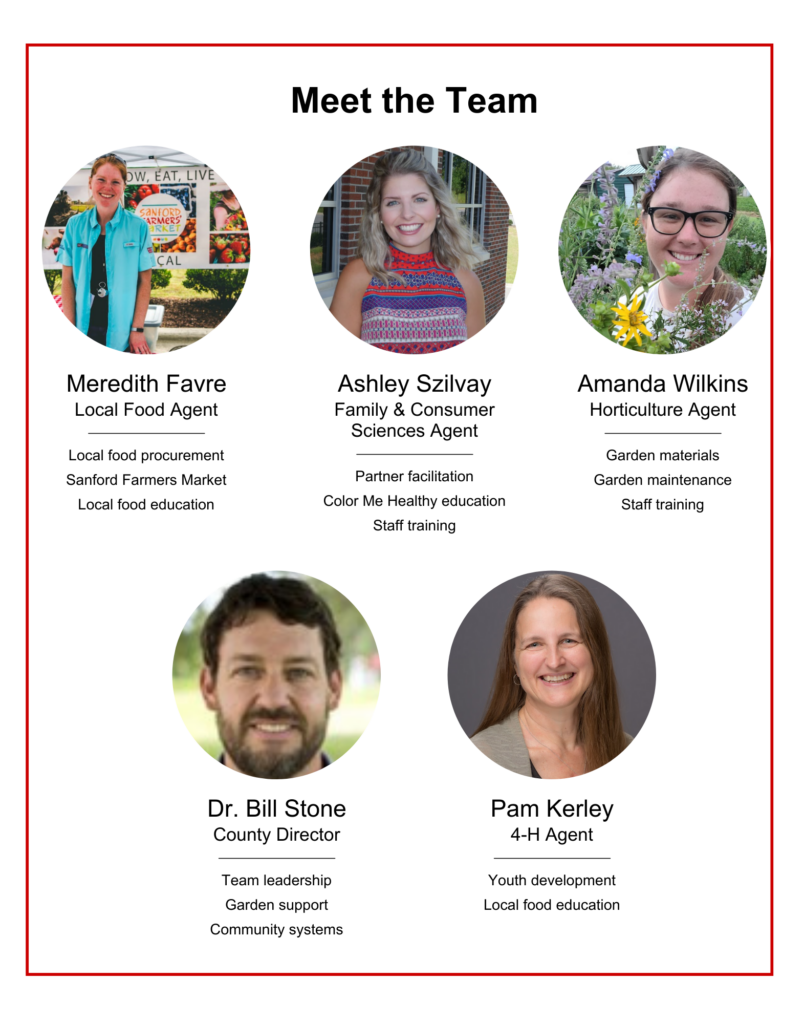Nurturing Local Food Connections Through Early Childcare: N.C. Cooperative Extension, Lee County Center
go.ncsu.edu/readext?955224
en Español / em Português
El inglés es el idioma de control de esta página. En la medida en que haya algún conflicto entre la traducción al inglés y la traducción, el inglés prevalece.
Al hacer clic en el enlace de traducción se activa un servicio de traducción gratuito para convertir la página al español. Al igual que con cualquier traducción por Internet, la conversión no es sensible al contexto y puede que no traduzca el texto en su significado original. NC State Extension no garantiza la exactitud del texto traducido. Por favor, tenga en cuenta que algunas aplicaciones y/o servicios pueden no funcionar como se espera cuando se traducen.
Português
Inglês é o idioma de controle desta página. Na medida que haja algum conflito entre o texto original em Inglês e a tradução, o Inglês prevalece.
Ao clicar no link de tradução, um serviço gratuito de tradução será ativado para converter a página para o Português. Como em qualquer tradução pela internet, a conversão não é sensivel ao contexto e pode não ocorrer a tradução para o significado orginal. O serviço de Extensão da Carolina do Norte (NC State Extension) não garante a exatidão do texto traduzido. Por favor, observe que algumas funções ou serviços podem não funcionar como esperado após a tradução.
English
English is the controlling language of this page. To the extent there is any conflict between the English text and the translation, English controls.
Clicking on the translation link activates a free translation service to convert the page to Spanish. As with any Internet translation, the conversion is not context-sensitive and may not translate the text to its original meaning. NC State Extension does not guarantee the accuracy of the translated text. Please note that some applications and/or services may not function as expected when translated.
Collapse ▲
Amanda Wilkins, Lee County Horticulture Agent teaches a gardening class at a childcare center as part of the county’s Farm to ECE initiative. Photo from Lee County Cooperative Extension.
The N.C. Cooperative Extension, Lee County Center is sowing the seeds of a vibrant local food ecosystem by bringing a “whole office approach” to their Farm to Early Childcare and Education (Farm to ECE) initiative. This initiative aims to provide education and local food procurement for early childcare centers to encourage healthy choices from a young age while supporting local agriculture. By working together, this team brings expertise in local food systems, horticulture, family and consumer sciences, youth development, and community development to offer a suite of services to five childcare centers across the county to promote connections to local food and healthy eating.
N.C. Cooperative Extension, Lee County Center excels at using a collaborative, cross-disciplinary approach for local food system development. They developed a comprehensive initiative called ROOTEd, which encompasses food preparation, gardening, and local food procurement. This three-pronged approach addresses multiple aspects of Farm to ECE, creating a strong network of support for daycare centers and the wider community.
The success of the Farm to ECE Farm to Fork Connection program exemplifies the N.C. Cooperative Extension, Lee County Center’s commitment to collaboration and education. The office offers the following services for childcare centers across the county:
- Garden Support – Assistance with purchasing and installation of on-site gardens at daycare centers as well as support with maintenance tasks and guidance on plant care and pest control.
- Virtual and on-site farm visits – In-person or virtual interviews with local farmers to learn about the different seasonal produce they grow, how they grow them, and to see the different parts of their farm.
- Color Me Healthy Curriculum – Steps to Health programming that focuses on promoting physical activity and healthy eating behaviors through sensory exploration
- Local food purchasing and capacity building – Weekly coordination of bulk ordering of seasonal local foods from a local food hub as well as distribution of orders to facilitate use of local foods for meals offered in centers.
- Farm to Fork Connection – A three-pronged program covering all three facets of Farm to ECE (gardening, cooking, and local food purchasing) through exploration and learning about local farms, plants and pollination, and preparation of healthy snacks all centered around a seasonal fruit or vegetable.
Lee County’s local foods landscape offers unique advantages and challenges. Being “well centered” (as marketed by the City of Sanford) near densely populated counties enables the establishment of a robust local food corridor, connecting local farmers with larger markets. The county’s ecological diversity supports diverse cropping systems. However, the spread-out farms pose distribution challenges, making the team’s coordination efforts vital.
According to the team, the future of local foods in North Carolina looks promising, but also challenging due to population growth and climate change. Strengthening connections between producers and consumers, fostering local food corridors, and promoting sustainable practices will be crucial in ensuring a resilient local food system for the state.
For Local Foods Coordinators across the state, the Lee County team offers valuable advice: collaboration is key. They emphasize the importance of teamwork among Extension program areas, community organizations, and farmers. This approach can be replicated to provide comprehensive local food programming that benefits communities, especially the youngest members.
The N.C. Cooperative Extension, Lee County Center’s dedication to nurturing local food connections showcases the power of collaboration and community engagement. Their innovative Farm to ECE program sets an example for a holistic, system-wide approach that empowers communities and encourages healthier lifestyles.

Ashely Szilvay, Lee County Family & Consumer Sciences Agent teaches young children about food at a childcare center as part of the county’s Farm to ECE initiative. Photo from Lee County Cooperative Extension.
If you are looking for fresh local produce in Lee County, the Sanford Farmers’ Market and Lee County’s roadside stands are excellent choices. The Lee County Family and Consumer Sciences Program’s Market Menu offers a variety of locally inspired recipes to tickle your taste buds and support local farmers. Stay up to date by following the Sanford Farmers’ Market on Facebook!



